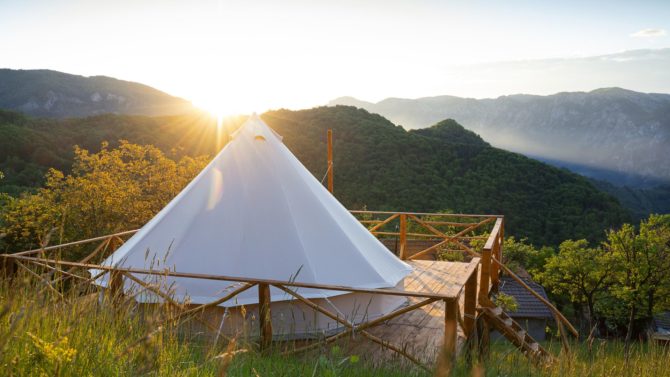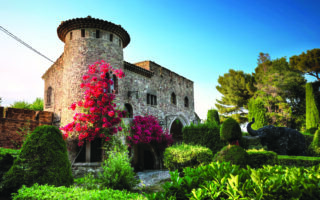Dreaming of setting up a campsite in France? This is how to do it!

If you’d love to start a camping or glamping business in France, you’ll need to understand the rules on planning permission and business registration first.
In France, control over the planning process is, in principle, devolved to a local level, with even the smallest communes having the right to create a local plan. In the absence of this, a national framework exists. You need to be aware of these in relation to planning permission for leisure businesses such as campsites, yurts, pods and mobile homes.
Planning is required where any land is to be used for such activities and, contrary to popular belief, the process is not straightforward, and a successful outcome is certainly not guaranteed. Let’s look at the difference between local and national planning frameworks.
Local rules
The more usual local plans are the PLU (Plan Local d’Urbanisme) and the CC (carte communale). The former is the most detailed version and will place every plot of land in a commune into a specific planning zone, ranging from agricultural to industrial, and from nature areas to residential. Each zone has its own set of rules defining what can or can’t be achieved, taking account of an overall plan set by the commune for development of the area.
A carte communale is much simpler and divides land in the commune into ‘constructible’ and ‘non-constructible’ zones only, with no further detail.
In many cases, local plans specifically exclude the use of land for camping or leisure use, so it is imperative that regulations are checked to ensure the project is feasible, especially if you are buying a property with land in order to set up such a business.

National rules
These apply anywhere not covered by a local plan. Known as RNU in France (règlement national d’urbanisme), they are used to control what can or can’t be built in any given area or commune. Planning decisions will be based on issues such as existing land use in the immediate vicinity, size of development, noise, public health and safety, architectural style and so on, but most important is the proximity of the land to the built-up area of the town or village. The further from the centre, the less likely it is that the land will be ‘constructible’, and the harder it will be to obtain permissions for any form of development, including leisure businesses.
Camping/glamping

If you’re thinking of buying a property with land in order to set up a camping or glamping business, there are some planning-related matters to consider, rules to follow and questions to ask yourself before you proceed with the purchase.
- Would you still buy the property if permission for the intended use were not possible? If it would be a deal-breaker to not have planning permission, then it is imperative to include a condition in the purchase contract that you will only proceed if permission is granted prior to completion.
- How many pitches do you want/need to make the project viable financially? Planning regulations are generally more favourable for small sites, while the regulations are more complex for a site with more than six pitches or units.
- What drainage facilities exist – mains or individual system? Planning applications require proof that an adequate waste-treatment system will be installed, and the cost of the system needs to form part of your financial considerations.
- What facilities will you offer? Shower and toilet block (whether an existing building or new block)? Restaurant? Shop? Will you supply electricity points to the pitches? If so, check an adequate supply exists, not only for the campsite, but for any owners’ accommodation or other requirements. Where the supply is inadequate, planners may refuse the application, or demand the applicant pays for any utility service extensions.
- ‘Camping à la ferme’ is a generic term where land is to be used for no more than six pitches, and a maximum number of 19 visitors at any one time. Anything more requires a different application, and regulations change. Recent changes to regulations can make the planning application in many cases subject to an impact study (or confirmation from the relevant authority that one is not required).
- Access: adequate vehicular access and parking must be available, together with sufficient turning space to enter and leave the site.
- Fire and disability access: where a building (eg WC/shower block, games room, TV room, shop, café etc) is available to visitors, it must adhere to ERP (établissements recevant du public) regulations. A separate dossier is required as part of the planning application for the campsite, and these add time and cost.
- Buying an existing site: it is important to check all permissions are in place, including ERP approvals. Where you intend to increase the number of pitches, you may need to undertake an impact study which may not have been necessary previously when the site was originally opened.
- For those deciding to create a glamping site with fixed units and individual facilities, such as pods, shepherd’s huts or yurts where there will be WC/shower facilities in each unit, then the rules are slightly different. Each unit must meet fire safety criteria, and a proportion will also need to be disabled-friendly (the number will depend on the total). Disabled parking will also need to be provided.
- Swimming pools: above-ground temporary-type pools do not as a rule require a permit, but permanent above-ground and all in-ground pools always do. There are strict rules about filtration and emptying, which need to be detailed as part of the application process. All pools must adhere to the safety regulations.
- Size matters. An HLL (habitation légère de loisir) is a fixed unit, such as a mobile home or glamping unit where the habitable floor area is below 35m2. These can usually all be considered as ‘camping’ use, though it can depend on a number of other factors. Anything over 35m2 is considered a dwelling, and consent may be much harder, especially in more rural/agricultural areas, so do your homework and consult a professional before assuming your project is feasible.
Outline and detailed planning permission
In France, outline permission is called a CU (certificat d’urbanisme). Anyone can apply whether they own the property or land in question or not. This type of application allows you to outline the project in reasonable detail, but requires only limited plans/drawings/documents – typically a site plan, service connections, existing and proposed building positions and uses, project description etc. If approved, the CU is valid for 18 months, during which time a detailed application can be submitted. A CU does not allow any work to be undertaken – it is just approval in principle.
Detailed planning consent for campsites of fewer than six pitches usually takes the form of a DP (declaration préalable), or sometimes a PC (permis de construire), depending on the size and complexity of
the proposal.
Larger sites and those with fixed units – glamping, for example – may need a PA (permis d’aménager). All of these give full permission for the project, but the dossier is far more involved than a CU, and full plans and drawings are required, along with the ERP dossier outlined previously. Each of these is valid for a period of three years.
Please note, a CU approval doesn’t always mean every aspect required for a detailed approval is possible. For example, it may conclude that in principle the land can be used for the purpose in question, but the detailed application may fail if, for example, the impact study reveals reasons why it isn’t possible. Proceed with caution and understand that a CU is only a general outline approval, and you may need to make your purchase subject to full permission in some cases.
Registering a business in France
If you intend to run any business in France, you must register with the appropriate authority. It is possible to do this yourself, but it’s often better to ask an accountant to deal with it for you to ensure it’s done correctly and quickly. There are many English-speaking accountants in France who can assist if language or terminology are barriers. ‘Bureaucracy’ is a French word, don’t forget!
Typically, your options would be to register with the local chambre de commerce as a self-employed person under the micro-entreprise régime, or as a limited liability company (there are various types). Depending on the size of the business, and the number of people involved as owners or directors, your accountant will advise the best registration for you.
Typically, the cost for an accountant to set you up as self-employed is around €500 and, for a company, around €3,000. TVA registration (French VAT) applies where the turnover exceeds around €33,000 per year.
Once registered, you are entitled to French healthcare through the carte vitale. Brexit has evidently made the process more complicated, so again, speak to a professional before you begin.
Arthur Cutler is the Director of France-based planning and design service French Plans
Share to: Facebook Twitter LinkedIn Email
More in Campsites in France, Working in France


